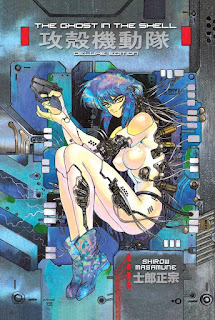Cyberpunk emerged as a science fiction sub-genre in the 80s, with the movie Blade Runner in 1982 establishing the aesthetic and William Gibson’s 1984 novel Neuromancer and the Bruce Sterling-edited anthology Mirrorshades establishing the thematic framework. Cyberpunk was science fiction focused on the effects of computer technology on human society on Earth rather than on spaceships, photon cannons and aliens.
By the end of the 80s the Japanese were embracing this new sub-genre. In Japan cyberpunk made its appearance in manga and anime rather than in novels and live-action films. This made sense. The Japanese did not have the western prejudice against comic-book and animated movies aimed at adult. And manga and anime were the ideal formats for cyberpunk. There were not particularly restricted by technological or budgetary concerns. The only limitation was the creator’s imagination and the creators of manga and anime had plenty of that.
The anima OVA Cyber City Oedo 808 in 1991 was fully-fledged cyberpunk. The Ghost in the Shell manga was most definitely fully-fledged cyberpunk and would spawn further mangas, several anime feature films (including Mamoru Oshii’s superb 1995 Ghost in the Shell) and an excellent anime TV series.
Major Motoko Kusanagi works for Public Security, Section 9. She leads a top-secret elite squad. Their main brief is counter-terrorist work but in this future world terrorism has become very high-tech and tends to involve hackers, cyborgs, robots and AIs.
The Major herself is a cyborg. She has a human brain and spinal column but everything else is prosthetic. She looks like a normal woman. In this cyberpunk world humans, cyborgs and robots all look human.
Are cyborgs still human? Do robots have rights? Can an AI be alive? These are themes that run right through this manga. These questions are of some personal concern to the Major. Is she a woman or a machine? She feels that she is a woman. She has a woman’s emotions and a woman’s sexual urges. Her body is entirely prosthetic (although it’s fully functional sexually). What matters is the ghost. The body (human or prosthetic) is the shell. The ghost is what makes us alive and makes human.
One of my favourite things about this manga is that Masamune Shirow has provided copious footnotes. Some give fascinating background technical details of this future world. Some provide philosophical musings (this is a manga with a heavy philosophical content). The most interesting offer insight what how the author sees the ghost. The ghost is not quite the soul, at least not in the way we conceive of the soul in countries with a tradition of Christianity. But it’s somewhat akin to a soul. Major Kusanagi is human because she has a ghost. But can an AI have a ghost?
That’s a question that becomes important when she encounters the Puppeteer. It’s not clear what the Puppeteer is but it seems to be a rogue AI. It may have a ghost. This becomes important for Section 9 when it claims political asylum.
The Puppeteer is not confined to a particular body (or shell). But then nor is the Major. She has several spare bodies. Her closest friend and professional colleague Batou has spare bodies as well.
AIs of course are confined to a particular location or body. The Tachikomas, the combat robots used in large numbers by Section 9, are a single AI. Which does not have a ghost. Or at least that’s been the assumption.
Shirow has little or no interest in politics as such but he is interested in power relationships, and politics in this future world is all about power. Mostly however he is interested in philosophical questions (this is a very cerebral manga) which can have a spiritual dimension. In particular he’s fascinated by the philosophical dilemmas that will inevitably arise if and when AIs become self-aware.
The cases Section 9 deals with (the structure of the manga is episodic) mostly hinge on the need to resolve such dilemmas.
It might be cerebral but there’s plenty of action and excitement as well. The Japanese have no problems with the idea of combining big ideas with enjoyable mayhem.
The Major is also interesting because unlike most kickass action heroines she is in a command position. If she makes an incorrect decision people die. Being an action heroine is not a game for her.
Ghost in the Shell really is great stuff - intelligent, provocative, mind-bending, sexy and fun. Very highly recommended.
I’ve reviewed Mamoru Oshii’s Ghost in the Shell movie elsewhere, as well as the first season of the Ghost in the Shell Stand Alone Complex TV series.



No comments:
Post a Comment